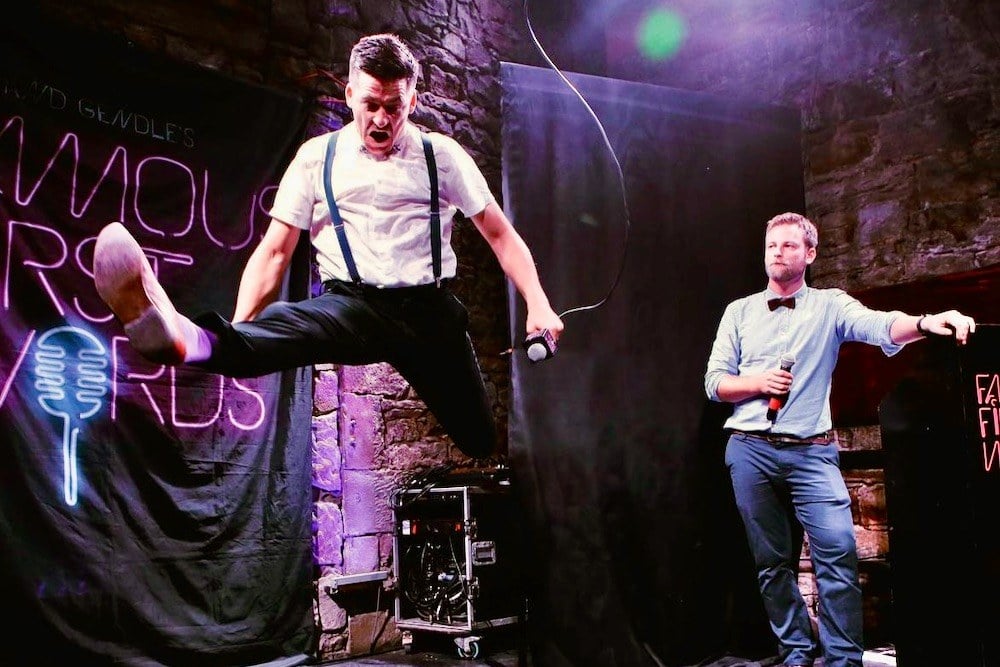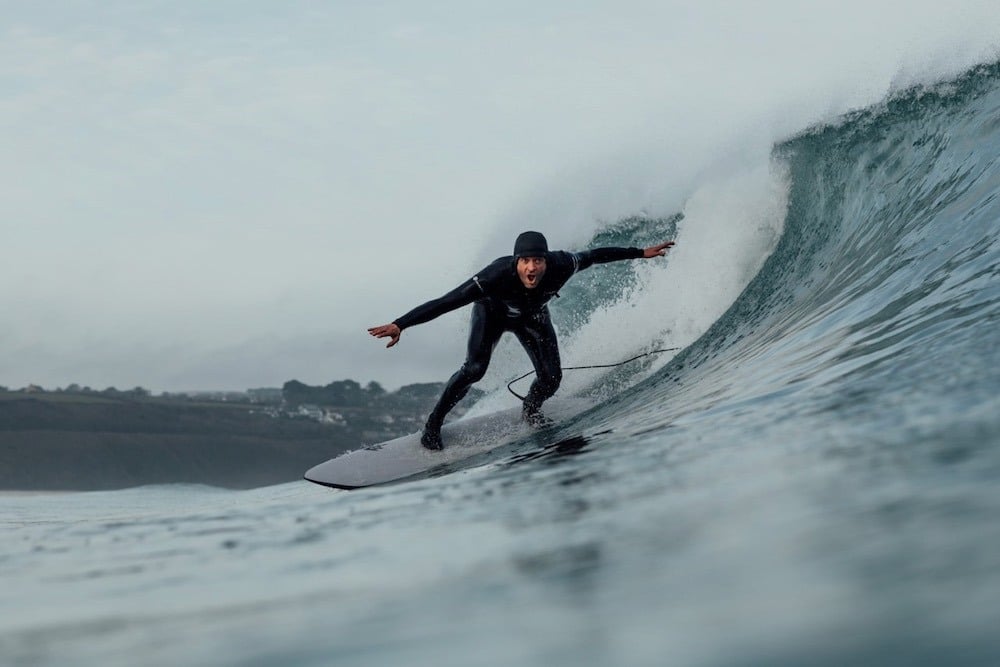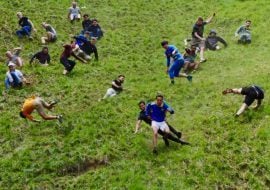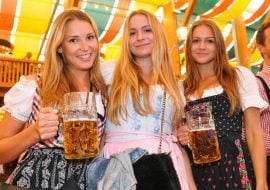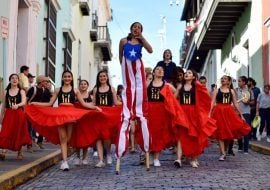Spanish Festivals: Wade Gravy


Episode 3: Podcast with Wade Gravy, a big Aussie guy based in Barcelona that knows Spain’s weirdest and wildest fiestas
In this episode Rad Season Founder Oli Russell-Cowan chats to Wade Gravy, former editor of Australia’s Surfing Life and life-long part of Stoke Travel. The Australian moved to Barcelona a few years ago. Wade is a traveler and lover of food, wine and partying. He has had some epic times at Spanish festivals we would say. Tune in for some of his best stories and what he thinks the festival culture will be like in Spain going forward.
Listen to the podcast:
Dive in and listen to this episode on Apple Podcast and Spotify.
Read the transcript:
Rad Season: Hi guys, it’s Oli from Rad Season and we’re here with Wade Grady, the former editor of Australia Surfing Life magazine and co-founder of Stoke Travel. How are you doing man?
Wade Gravy: Doing pretty good just sitting in the sun anticipating the start of summer. It’s what’s already quite warm and it’s only like what, I’ve lost count of the date. What are we in now? It’s May, mid May.
Oli: Whereabouts are you?
Wade: I’m in Barcelona. I’m in downtown. I’ll show the people, look at this.
See that big boat in the back there? That’s not mine.
I’m not even allowed within a 100-meter radius of that thing. But yeah, I’m down by the port in Barcelona sitting on a terrace. Right now the street scene actually has more going on than there has been in the past two months.
There’s a sprinkling of people that are out, I think at this hour, families are allowed out with their kids for an hour. And there are some cars driving around. I can tell you guys that two months ago I was in Bali when Spain went through a state of emergency. I had to rush back so I didn’t get stuck there. And when I got back, it was cold and grey.
It was gloomy and the streets were completely empty of people completely devoid of any kind of life. You’d look out and there’d be one person in a mask, scurrying across to go to the supermarket. So that they couldn’t buy toilet paper or rice because it was all sold out. So now there is definitely some life creeping back into the city for sure.

Oli: That’s good, man. You guys are in phase one you were saying. Where do you see the situation in Spain going?
Wade: Yes. exactly. So Spain’s has a 4 stage de-escalation planned. We had a really, really strict lockdown. So we weren’t allowed out at all unless we were going to the supermarket and you were supposed to do that once a week. And that’s it. That’s the only time you were allowed out of your house. That lasted for six weeks or something.
We were in that sort of state of lockdown. We’re still in phase zero, they call it 0.5, which means we’re allowed out between 6am and 10am. Or in the evening around sunset to exercise and that’s it.
On Monday we go to phase one which means we’re allowed to be with friends we don’t live with, 10 people Max. Terraces will open up so not inside restaurants but outside bar-restaurants will open up to 50% capacity. I am dying to have someone else pour me a wine.

Oli: What kept you sane during that time?
Wade: I didn’t stay sane.
No, look, I don’t want to get old or soppy here. But I think the main thing that helped me remain sane throughout was knowing that what I was doing was contributing to getting everyone else out of this as quickly as possible and to do my part for people who aren’t as capable as I am.
I think of defeating this virus, you know, like, I’m pretty sure that I should be able to defeat it, but you never know. But I didn’t want to go out and be frivolous and catch it and pass it along to the elderly or the immunocompromised people. That’s what kept me sane, mostly.
I work for Stoke, as you mentioned in the intro, and we’ve stayed busy working from home. Throughout this period, we actually had to cancel pretty much all of our 2020 travel. Which was a bit of a bummer for obvious reasons.
2020 travel has been kind of canceled for us, but we’re working on bigger projects. So when things got canceled we didn’t say Okay, that’s it. Let’s just give up for the year. We’re like Okay, let’s see what we can do in 2020. Then let’s look forward to 2021 and start making big plans for that.
Whilst it’s obvious that tourism will bounce back. We’re pretty sure that on the back of people not being able to travel and being locked down at home everyone’s going to go pretty crazy for travel when they can get outside and when you are allowed to jump on a flight again.
I’m making so many personal plans. I want to do all this nuts stuff because for the past few months, I’ve been sitting here watching it turn from winter into spring and now into summer, and looking off my balcony going I want to be out. Insert place name, and enjoy this weather and enjoying these experiences.
I’m pretty sure it’s gonna bounce back massively when it does.

Oli: What kind of plans are you making?
Wade: Me personally, I’ve become this crazy hiker. I’m a hiker. So I’m looking at really, really long hiking routes. You’re in Lisbon, you said before? So there’s a hiking route I’ve been looking at that goes from Valencia to Lisbon.
So you hike across the midriff of Spain. So I’ve been looking at stuff like that like getting out there and doing long-distance hikes where you get to see a lot of small villages and different cultures and eat a lot of local food. You see it all up close, you know, because you’re going at a very slow pace, a very slow pace. So you get to see everything up close and stop and smell the roses and you meet the farmer who makes the cheese and he also makes his own wine.
I definitely stumbled across a lot of really interesting places when I was filming the 50 fiestas project, and going to all these small villages and seeing their traditional parties and then also a part of that getting to know the people and the type of food that they eat. All that stuff that is really super localized in Spain and across Europe.
I’m from Australia, if you didn’t pick up the accent, we just sort of have a blunt culture across the whole continent down there. Whereas here you can, you know, if you’re walking from Valencia to Lisbon, you’re gonna go not only to two countries, you’re gonna go through maybe 10 different provinces and every day, you probably walk 20 kilometers and go through three or four or more villages.
They will all have a unique national holiday, a unique thing that they make that they’re proud of. They’ll have a reason to not like the village you just came from because we make the better cheese and their cheese is terrible. They’ll have their own wine and all this other stuff that you can experience on the ground here in Europe. So I really want to get back out there.
I want to get out of Barcelona. I love it here. Don’t get me wrong, but I want to get out of here and go and see some regional tourism and I want to pay a lot less for food than we would be paying here when this thing lifts.

Oli: How many years have you been in Barcelona?
Wade: I’ve been coming here to spend months at a time so not just visiting, but coming to live for seasons for 15 years.
So coming to Barcelona, spending some time here then moving to San Sebastian on the other side of Spain or living in London or going back to Australia for 15 years. For the past four as of like a week ago. I’ve been living here full time. This has been home for four years.
I’ve seen it change a lot in that time. And it’s actually kind of interesting that before this COVID-19 situation Barcelona’s tourism was going pretty nuts. It was really busy.
I live in the center of town and you couldn’t go outside to sit on a terrace and drink wine without having to wait for a table to pop up. You couldn’t walk down the street without it being flooded with people going to the beach and seeing the sights and the cruise ships pulling up behind us here and 10s of thousands of people a day who would just walk around the city take photos and jump back on the cruise ship and leave.
So this virus thing has really made the city reset. Obviously there are no tourists here at the moment. So when we are allowed out to exercise the streets kind of full of people but everyone is local.
I work in tourism, I’m not anti-tourism by any stretch of the imagination. It’s just, I feel like in a city like Barcelona, it really needed that reset to rethink the way that they can approach tourism. Everyone wants to come to Barcelona. It was getting to a pretty unsustainable level, which is rich, for me a foreigner living.
You can just see when you get on the street, and you can’t move around, because there’s so many people getting around the city and now it’s completely changed. I guess another consequence is that there was a bit of an anti-tourism movement here amongst the locals.
Now they’re seeing how much they rely on tourism, right? Now they’re seeing the economic hit that they’re going to take from having no one here for the past two months, and maybe for the rest of, you know, maybe for the next month or halfway through summer or maybe the whole summer. We don’t know. It’s an interesting little experiment that we’ve involuntarily undertaken here in Barcelona and in Spain, in Europe and around the world, to see what the world is like without tourism.

Oli: It definitely feels the same way in Lisbon as well. Looking at everything differently.
When’s it going to go back and how’s it gonna go back and can people do it sustainably.
Wade: Do you get cruise ships in Lisbon?
I don’t think cruise ships are gonna be too popular after this.
Oli: Is that a cruise ship behind you?
Wade: That’s privately owned. It’s owned by a Russian gentleman. I’m pretty sure that he owns the one in front too. I don’t know what business he is in. I think it has been the biggest in the world last year. I think it was the biggest personal yacht in the world.
Even if you can travel these guys have these huge yachts and they just leave them there. Yeah, they don’t go, they don’t really go anywhere.
Stoke Travel
Oli: Could you give us just a bit more of an overview of when you guys started Stoke Travel and what the reason was?
Wade: Totally, We started in 2005, 2006 as a surf travel company. So we would take people from San Sebastian in Spain. We put them in vans and drove them up the coast and did surf tours. We’re from Australia originally and are keen surfers.
So we wanted to do that ourselves. We were like, let’s surf the coast. And if we can find a way to get people to come along and enjoy the experience with us all the better. So we would spend our nights in the bars of Sebastian meeting travelers and saying, What are you guys do tomorrow? Let’s jump in the van and drive up the coast. And we started doing that.
We still have a heartland there in the Basque Country. We still have that surf house there, which is open this summer. We still have that in our DNA. Like that’s, that’s sort of our backbone is that we are surfers, we love the ocean. We love traveling and partying and all that sort of stuff. So we did that for a few years and then we started to diversify and move into festivals.
So the obvious ones are the Spanish fiestas. We were based around that part of the world. So we started going to Running of the Bulls, San Fermin in Pamplona. We started going there and taking people along to that.
There’s one near there called La Batalla de Vino in Haro, which is in the lovely red wine region of La Rioja, Spain. So we would go there and it’s a big wine fight. So people would go there and throw wine at each other. So we would do that also.
And then La Tomatina, the Spanish tomato fight. So there are three Spanish festivals that we still do, not this year, but that we can sort of guarantee will bring a pretty regular crowd of people.
For a while now at Running of the Bulls in Pamplona we’ve been focusing as a brand being more about the San Fermin Fiesta as opposed to the actual Running of the Bulls.
We’re not big fans of the Bull Run personally ourselves. We do think that people should come and make up their own mind about it because we don’t want to say, you know, this is what you should believe. But what we really like about that one is we really like the fact that there’s this huge street party which is probably the most emblematic Spanish Fiesta there is.
It’s like the one in Spain, it’s got the biggest crowd, it’s got all the traditions and apart from the running of the bulls, which goes for five minutes in the morning, the rest of the day and night is full of music and dancing in the streets, drinking, eating food and concerts and possessions and all this other stuff.
So we focus on that. If people want to come and do the Bull Run, that’s up to them, we give them information and we help them out for that.
Oli: It’s more about the party element around it?
Wade: Exactly and the culture and getting to know them. Because in Nevada where Pamplona is, the majority is Basque so it’s Basque culture and Spanish culture. They’re combining and everyone wears the white and the red and they drink from the wineskins. It’s just a really fun experience.
You’ve got every demographic of society you’ve got the old lady’s cooking paella in the streets. Even though paella is from Valencia, they seem to eat it everywhere. Everyone who’s older than 10 seems to be drinking sangria.
So that side of the Spanish Fiesta experience was something that really appealed to us. Coming from Australia, we don’t have that kind of thing. You know, you can’t tell the whole city, the whole town, the whole village to
“Hey, let’s all go in the street and drink for a week straight.”
They would be absolute mayhem for some reason in Australia. It would be chaos. So we turned up to these parties and Spain and were like whoa, how does this happen?
Yeah, it’s so much fun and it’s not a bad thing. It’s not this negative experience that needs to be legislated against. It’s actually an overwhelmingly positive experience that has its problems like anything does, but you know.
So what we discovered from that is then we started to go to this one in Haro, which is not far from Pamplona. Haro, this tiny winemaking town they would do the same thing on a smaller scale. Everyone would be out on the streets drinking and partying and dancing and concerts and go out all night and then all day.
The next day we have this wine fight where for a few hours everyone’s throwing water on each other, you’ve been there you know what it’s like.
We came to the conclusion, the theory may be that they must have these things everywhere.
After a little bit of research, we found out that Yeah, they do. Every single village, every town, every neighborhood has these fiestas where they party for days, if not a week, every year without fail.
It becomes this central theme in these communities. They build up to these fiestas and then they spend their week just letting their hair down and going crazy in the streets.
Then when it’s finished, they go Okay, let’s start planning for next year. You know, it’s that important to them that as soon as it’s done, they’re like, Alright, let’s just have one day for the hangover. And then let’s start planning for next year’s extravaganza. We just fell in love with it.
50 Fiestas
Wade: At Stoke we do those three because they’re three that people know or that you can get people to at a good time of the year.
My other project, 50 fiestas, we discovered at least 47 more. The plan was to film 50 fiestas. To be fair, we discovered hundreds more of different outrageous crazy fiestas and experiences around Spain.
A lot that you’ve been too right?
Jarramplas Turnip Festival
Oli: The last time we spoke you were giving me some advice on Jarramplas, which is one of the craziest festivals I’ve been to. Sort of like tomato festival but instead of tomatoes they use turnips, which was pretty nuts.
I thought there were only gonna be maybe a couple of hundred people throwing turnips at this poor bloke but there were thousands.
Wade: That one was just so fun. Scary and interesting. They literally have tractors that dump piles of turnips in strategic points around the city, so that when this poor guy in the suit gets battered, he knows that he’s hit like he actually knows he’s supposed to run past these piles. I guess because he runs past the pile and everyone’s like, a pile of ammo.
I knew what a turnip was right, but I’m just I wasn’t so familiar with a turnip. Before I did this. I just didn’t realize how big, heavy and hard they are. Like it’s an actual weapon.
A projectile turnip is a weapon right. It hurts.
Oli: It’s cold there. It’s up in the mountains of Extremadura.
Wade: It’s incredible. The town Piornal, it’s on that ridgeline between two valleys. I was there maybe two years before you were there this year, right? This January. So I was there over two years before that and it snowed.
It was freezing so that the turnips were frozen. Giant frozen heavy, hard projectiles.
Oli: With 50 fiestas have you guys been to all of those?
Wade: We’ve filmed about 20 out of the 50. At the moment, everything’s on a pause because of the COVID situation and basically to be honest, we chewed through our budget to film 20.
We definitely bid off more than we could chew, we jumped in the deep end. So we’re just sort of looking at some options there, but of the 20 that we filmed, we’ve got some good stuff. So we can go and show some people be like, Hey, Mr. Hollywood, do you wanna do you want to get involved in this crazy documentary series where we go around and use parties, these traditional parties as a springboard to better explore the culture of the village that we’re in, or the town and also the Spanish and European culture in general.
There’s this greater sense of fraternity amongst the people I feel then in Australia. Australia is much more individualistic. We all have our own house and our own garden and you know, and we definitely we’re very outgoing and we have friends but we don’t actually live in each other’s pockets and rarely live with each other.
We socialize then we go home. We go to the pub and then we go home. Whereas here in Spain it’s different.
Colacho Baby Jumping Festival
Wade: Did you get to the baby jumping?
Oli: No, I was planning on going this year but hopefully next year.
Wade: The baby jumping festival was in a town literally in the middle of nowhere. You couldn’t even walk from the nearest village to get there in a day. It’s so remote and it’s tiny. It’s a one-bar town, which if you know Spain or Portugal, you know that a one-bar town is pretty small.
Even there, they all live on top of each other. Their terraced houses actually joined together and there’s small flats and stuff. Because even though you’ve got hundreds of kilometers around you Spanish people still want to live on top of each other. Instead of having their beer at home, they all go down to the local bar stand around and have a beer and they talk and gossip. Or they sit in the street, they talk to the neighbors or the kids or play together in the playground together.
I just realized that I just mentioned the baby jumping and then continued on some sort of diatribe about how Spanish people live near each other. I should probably explain what baby jumping is. Right?
Oli: There are some odd ones over there but that’s gotta be up there.
Wade: That one on paper, you know, like, because they jump over babies. So you know.
A lot of these villages, people who are in their 20s go away for university and in their 30s and 40s. They might go and 50s even might go and live in the city might go and live in Madrid or Barcelona or whatever to pursue their careers.
They maintain ties to the Pueblo, to the village. So they maintain ties to the family and the village. So they’ll go home for summers or they’ll go home for these fiestas. So these people are the sort of diaspora of these small villages. This village is called Castilla de Murcia, which is near Burgos.
They will come back when they have kids. They’ll come back with their babies. They lay them on the ground on mattresses, thankfully, and the local church will dress people up in this yellow costume. It’s supposed to represent the devil but it’s yellow with a mask and a whip. These two guys run around the city jumping over the babies and they leap over the babies.
“Everyone’s drinking wine and those guys are jumping over babies. It’s a pretty bizarre situation.”
We filmed it so we want to know what goes on there, why do the local guys do this. They told us it was a baptism. So it’s a way to baptize the babies. I did a bit of research and the Catholic Church the Pope from a few years ago came out and said, “Nope. We have nothing to do with this. This is not a baptism ritual. We do not, we did not approve of this.”
“I asked the guy doing the jumping. Is there any danger of landing on a baby? And he goes, No, no, no, look, we take this super seriously. I trained really hard for this. I quit smoking a month ago.”
Oh, cool. You quit smoking a whole month before you jump over babies. That’s great.
Oli: You got to put some precautionary measures in right?
Cascamorras in Guadix and Baza
There’s also Cascamorras. I went to that place last year near Granada. That’s insane as well. Apart from baby jumping, all these festivals seem to revolve around some sort of food or drink.
I didn’t actually spend enough time there. That’s one I really want to go back to. If my girlfriend is listening it’s not because of the Andalucian babes all covered head to toe in oil, okay. It’s not because of that. It’s because it’s amazing. It’s apocalyptic. There’s a guy with a particular statue or something. He’s got this thing that he swings around and chases everyone around town.
The ritual is he steals a statue from one town and tries to get to the other town. So everyone’s greased up and chasing this guy around who’s swinging a rope around trying to attack everybody.
It’s extremely enjoyable.
Oli: I loved it. And it goes on for two days in two different locations?
Wade: Exactly. It’s in Baza the first day and that’s where they’re all greased up there. They’re covered in oil. And then a couple of days later, they make their way to Guadix which is, if anyone’s ever in the Granada, Sierra Nevada, area of Spain. Go and check it out. They live in caves, they literally live in caves.
Oli: You can stay in a cave too?
Wade: I stayed in the cave. And the cave people really love their caves.You say what’s the advantage of living in a cave. Sit down. Have you got four hours? Let me tell you about everything that’s amazing about living in a cave. Climate Control.
When the Cascamorras gets to Guadix they cover themselves in colorful powder and paint, not the oil.
Everything gets messy. You know, all of these festivals apart from baby jumping get messy. Thankfully, you could say the baby jumping is a messy festival that would be very grim.
“In exercising their love for their village, they absolutely destroy it.”
Covered in oil and paint and tomatoes and turnips and whatever it may be. At Jarramplas in Piornal the locals in the village board up their windows. They’re like oh, people are going to come throwing turnips anytime. Now let’s just board up the windows because we’re cool with it. We’re okay with them doing that. We’re just going to board up the windows and not complain about it.
Oli: We went to Ibi the flour fight festival just outside Alicante. That was nuts, it’s like a theoretical thing. There are maybe 25 guys dressed up as the army reenacting a military coupe. They wear these pretty creepy Second World War uniforms and then they’ve got fire extinguishers, eggs and flour and rockets attacking each other going mad.
Wade: Do you get egged yourself? Do you get hit? Is it like collateral damage?
Oli: Yeah, you get hit by like eggs and flour. Yes, it’s pretty fun. It’s strange. It’s messy as well like you’re saying, you know they get a bit messy.
These Spanish festivals are the tradition of the village and the country that they’ve been running for hundreds of years, right?
Wade: Yeah, a lot of them have been.
A lot of them could trace their histories to sort of pre-Roman times. You can see that in some of the festivals. Like baby jumping is a great example of that where they had this tradition that they did in that part of the world and the Romans arrived with their Christianity and where like.
‘You guys jump babies. Oh yeah, you can do that in Christianity too. That’s cool. It’s the patron St Peter’s Day and you can jump over babies, that’s fine.’
There’s lots of stuff like that where you can see that the church has actually sort of been like we’re not going to stop these guys from doing this crazy pagan ritual we’ll just coop it and make it a part of our calendar so they do that.
So it must be so strange for them this year to have all this stuff canceled. Like I said earlier they prepare the day after the event for the next year’s event. So on the day, it’s supposed to run this year, I can’t imagine them still not partying in some form.
For sure they won’t have the organized thing and they won’t probably go through all the rituals, but there’s no way in the world again to let these dates pass and if they’re in lockdown, do it at home. If they’re out of lockdown allowed in the streets they have to do something.
They’ve got hundreds of years of tradition. Like your parents met at this festival. Your grandparents met at this festival you’re gonna meet your partner at this festival probably you know. It’s so integral to these societies.
This year everything is just on pause. It’s really weird.
Oli: Are you guys getting ready for next year when these festivals come back? Oktoberfest, Tomatina, Haro?
Wade: 2021 is gonna be big. A lot of people who booked this year we refunded but probably more of them just postponed which is cool.
So for all the people who want to come this year, there’s gonna be a percentage of those coming in 2021. And then also the people who didn’t get to travel this year will want to do something cool next year as well. So we’re looking at a big year for that sort of stuff.
So first up we’ll have Haro the wine fight.
Oli: That’s in June every year, isn’t it?
Wade: That’s in June. It’s the 29th I believe, wouldn’t quote me on that it’s 28th to 29th every year.
So what we’re doing at Stoke now is we’re trying to put together something a little more comfortable from now on. We stay in campsites. We are going to offer bigger tents and we’re going to include brunch, bottomless brunch with Kava included in the mornings before the festival.
I’ve been doing this for 15 years now. I turned 40 this year, and I want to have bottomless brunches, and I want to have Kava.
Just like, like the birth of Stoke where we started surf camp because we wanted to surf. Now I want to have nice things and still party.
Oli: You got to Gravy, treat yourself.
Wade: Yeah, exactly. What we’ve noticed is that young traveler because we’re still appealing to people who are coming to Europe for the first time, young travelers in 2020, 2019, maybe even 2018 and into the future that they’re looking for sort of a more glamping style or, you know, what do you call the nice hostels. People are looking for a bit more of an experience so they can take photos of themselves in a nice situation and put on Instagram, rooftop bars and pools, that sort of stuff.
So we’re just sort of trying to move with the market and give these guys who are coming to Europe an experience that they might feel intimidated to go to by themselves.
Like turning up to a Spanish festival on a bus by yourself and finding a hotel room and then knowing what time to get there and what you can and can’t do.
These things have traditions, you know, like, you say someone goes to the running of the bulls for the first time and no one tells him how to do the Bull Run, they can get seriously injured, they can get beaten up by the locals.
All sorts of stuff can happen by doing these faux pas that you never actually knew were faux pas. Not just having the confidence to turn up to a new town and go, Hey, guys, this is your party. I’m from Australia. I’m from the UK, I’m from America, and I want to join in. It is really intimidating.
If you get lost in a tomato fight, you just find the stoke travel t-shirt and you go, Oh, that’s a friendly face. I can go and talk to that person and say, Hey, I’m lost, where does the bus leave from or whatever.
We want to keep traveling adventurous. We don’t want to create a situation where we’re the foreigners outside of the party and people are sort of being culturally insensitive and not getting involved.
We want to make sure that people get there and learn about it and get involved and meet the locals and all that sort of stuff. We want to provide that safety net whereby when things get too weird, or things get too foreign, or you know, all of a sudden people throwing turnips at you know.
You know you have a sort of a red button that you can press and you can sort of just get back and you can speak English to somebody and say that was weird and they’ll say, yeah, you should have seen what happened to me again.
That’s been our goal for a while now. COVID is very tricky for us, but it by no means has stopped us from pursuing that goal. We’re still going to do what Stoke Travel does what we’ve done for 15 years. We’re going to wait this one out and make big plans.
We’re working on marketing and systems to come back in 2021 and still provide that experience and that service to travelers. If they’ll hang out with us. If you want to hang out like don’t be scared that I’m 40. We do have young staff. I’ll sit in the background somewhere you won’t even see me. Until the fiesta starts.
San Juan Festival in Menorca
Oli: Any festivals that you particularly want to go back to or that you keep going back to? They’re all kind of unique in their own way. But is there one that stands out to you?
Wade: Yeah, there are so many. If I could recommend one Spanish festival to people listening. It’s not going to be on this year. It will be on next year. It’s the San Juan Festival in Menorca.
Everywhere in Spain celebrates the summer solstice, the longest day of the year. It’s around the 23rd of June, every year and everywhere in Spain they do something. Everywhere in Europe they do something.
This goes all the way back to pagan times and prehistoric times when you would celebrate the longest day of the year. Out in Menorca, it’s stunning. You’ve heard of Ibiza and Mallorca but you and a lot of maybe haven’t heard of Menorca. It’s the smallest of the three Balearic Islands. It’s incredibly beautiful. It has some tourism infrastructure but it’s more geared towards Spanish tourists then package Germans package English, package Dutch tourism.
Out there on this beautiful stunning island in the middle of the Mediterranean on the longest day of the year. They have these special horses, these big black horses they have. I don’t want to say big black stallions because it sounds like they could be geldings, or whatever.
They bring them through the city and through the crowd and they rear up on their hind legs. And everyone’s in this crowd and they sort of get underneath the horses and hold the horses up while the horses rear up and then the horse will prance around some more and then everyone drinks.
They drink Pomara which is gin mixed with lemon that’s frozen like a slushy. It’s like an icy slushy. It’s super, super strong. Everyone drinks this gin slushy all day in the sun in this beautiful white-walled Citadel on the Mediterranean, this beautiful island.
It goes for two days. They do all sorts of horse games, it’s just stunning. It’s a spectacular setting. It’s a spectacular event. The day of the year has meaning because it’s the longest day of the year. It’s the official start of summer, you know, once June 23 goes by then it’s on. It’s a really cool one if anyone wants to get down and check out a not so explore part of the Mediterranean.
Compared to Ibiza and some of the other islands around there.
It’s really exciting and interesting and dangerous because the horses do these horse races and stuff through people. It’s really cool. And they really, really love horses there.
One thing that’s cool about that one is that all the villas in the city, they’re built to a size. They have rooms built in the front of them that the horses can enter. So the family will be in their house, drinking and eating and the horses these big black horses will come in with the rider and they’ll give the rider a drink. The ride will have a drink and a smoke inside the house and the horse will do a shit inside the house and they’ll just sweep it up and then the horse will leave.
This horsemanship is really a really massive part of their culture out there.
I don’t want to speak on behalf of animal rights activists or anything like that, but from my perspective, someone who’s a bit of a bleeding heart when it comes to those causes. I couldn’t say that it was the mistreatment of the horses though.
Locals really love the horses and the horses are part of their society. One day a year, the locals are given the opportunity to party alongside these horses. It’s a really neat event.
Surfing in San Sebastian
Oli: Are you guys going to be running surf camps again? You got one in San Sebastian, is it going to be open this summer?
Wade: Yeah, open for business. As soon as people can get there. So Spanish people, people within the province that the surf house is in can already arrive there. Then the borders will dissolve. The border restrictions in Spain will dissolve in the next couple of weeks. So people living in Spain residing in Spain, will be allowed to travel there. Then the rest of Europe and the rest of the world.
We’re doing a special deal. Actually, we’re doing a special deal first night free. Tell them that Gravy sent you. There’s actually a promo code, the promo code is ‘Corona don’t surf’.
Because we don’t think that it does. To encourage people to come back.
A little bit about the surf house. It’s a reformed Basque farmhouse. It’s in a little village called Aya. So it’s in the mountains. It’s like the pre Pyrenees mountain range.
So you’ve got these mountains that go up from the Bay of Biscay, the Atlantic Ocean, they go up, and then they eventually turn to the Pyrenees, and that’s that great Ridge that sort of divides France and Spain and runs from Atlantic to Mediterranean. Our house is up on the hills. You look down across these undulating green hills to the sea, from the farmhouse from where you stay.
The backyard, backs onto a national park so you can walk out the backyard of the surf house and you can walk into a national park. You can literally hike for days and just walk through the vast mountains.
We have a skate ramp. We have a beer tap, we have unlimited cider. We have unlimited wine, there’s a chef there that cooks for you. And every day we do surf lessons, if you need surf lessons, or if you don’t need surf lessons, we just give you the surfboard and off you go.
We do like an all-inclusive sort of package down there. So people just turn up. They stay in this beautiful spot. You know, this spectacular setting in this nice converted Basque farmhouse. Aya the village that we’re in is the most Basque place I’ve ever been to. You hear people speaking Spanish and you know, in Aya in the Basque Country they speak Basque. Some of them the farmers will actually feel more comfortable speaking to you in English than they would in Spanish.
They just live in the world of speaking Basque. They have their own national holidays, they have fiestas of Aya. They do a strongman contest. We call it the Basque Olympics. They’re rural people and their prehistoric people have been living in that place forever.
Oli: Isn’t Basque like the oldest language in the world?
Wade: That’s what they say. It’s the oldest living language. Because when the Celts and then the Romans came through that part of the world, the Basques were a little bit of a nuisance for the invaders so they sort of did a deal with them and didn’t conquer them and say speak your language speak Latin, like they did to the rest of Spain, France, and Portugal.
So the language survived. It’s wild, it is so wild that the words are like that long. They have lots of lots of x’s following T’s in their words like Word has attained and an x and then small letters in a z.
It’s super interesting. Basque food is some of the best in the world. A trip from the surf house, down the hill, we go to a Cider House in an apple orchard. There’s this big old building with huge vats of cider. They do an all you can drink or you can eat steak menu. So you sit down, you have a five-course meal of omelet, local codfish, steak and when you finish your steak, this big lady says you want more steak.
You chew the bone like Fred Flintstone with his big bone thing. Then you go to these huge vats and they just turn the tap on and you just hold your cup and catch Cider as much as you can drink and it’s like 30 bucks.
It’s so cheap to go. As far as cuisine, landscape and cultural stuff is concerned, that’s where we started in Spain. We started in the Basque Country in San Sebastian.
Now we’re just out of town. We’re still called the San Sebastian Surf House but we’re just outside town in this little village.
What more could you want from a pre COVID-19? vacation? I don’t know.
Winter Festivals, Ski and Party
Oli: What about winter? Are you guys doing any winter holidays or any winter festivals?
Wade: We’re looking towards putting some stuff together for the winter. Generally, in winter we do a lot of work with study abroad students who were not so sure if we’ll be back before 2021, but maybe they will be. We’ll see.
So ski trips, obviously, are one thing that we do here in Barcelona. We’re right near Andorra just up the road. So we can do ski trips up to Andorra.
We’re trying to do something in the Alps where we do like a bit of a festival and go and rave in the Alps.
There’s a few things. Not so much Spanish festivals because as you found out in Piornal, it’s cold. When you think of Spanish festival holidays, you don’t really think you’re gonna go and it’s gonna be freezing cold and you want to be in the sun drinking sangria.
Carnivals
Oli: Are you guys going to be doing any Carnivals?
Wade: We stick around here for Carnival. There’s a cool stage for Carnival.
Oli: The last festival we did was Cologne. I never knew Europe offered this. When you think of carnival, you think Rio de Janeiro? Somewhere tropical?
Wade: The carnival celebration that we go to is Sitges. It is 40 minutes down the road here in Barcelona and it’s hectic. It’s a huge carnival procession, drinking in the streets and party, even though it’s cold, because it’s winter. It’s such a good party like before you know it you’re topless.
And it doesn’t matter. You’re dancing in the streets.
I think for us to do Carnival stuff, we’ll probably stick around Barcelona and Sitges again. But you know what, we don’t know what if the study abroad students don’t come back then maybe we can plan something a little bit further afield.
There’s so much stuff because these dates line up every Carnival. There’s all this cool stuff around and I get stuck doing the same thing every year.
Whereas I want to go and check out the weird ones that are in the other provinces. I know there’s one in Aragon where the young men go and dress in animal hide. So they were like bear hide and run around harassing people. So I want to go check that out because it looks really savage and cool.
“I went to Galicia where they throw ants at each other, fire ants for Carnival. That was crazy. That was really crazy”
The ants hurt when they bite you and now we’re throwing handfuls of them at everyone.
Weird Spanish Festivals
Oli: You’ve been to a lot of these weird events. What’s the thing that makes them special?
Wade: Apart from the fact that there’s a massive WTF moment. What is going on here? This is just insane. Apart from that, it’s just how open and generous the people become.
Spanish people are pretty outgoing people, but during these festivals they double down on that. So you’ll go there. They’ll tell you to come into my house and dine with me and you know, drink, drink, drink, and you end up getting hammered because you’ve been hanging out with a little old lady.
So that’s what I like the most, I think. Just seeing how open people can be and getting to know a little bit about their culture with them and just having a really, really good time. You know, there’s nothing stressful, you’re just there to enjoy yourself.
I think after all this COVID stuff too we need that more than ever. We just need to have a good old fashioned knees up where we go somewhere and let our hair down.
The first festival that’s on is gonna be nuts. All my music festival tickets got canceled or got postponed just now. So no one’s even gonna have music festivals this year. They’re doing stuff online but it’s not the same.
As soon as this stuff comes off and people start having events again they’re gonna be crazy and I can’t wait to be there.
Oli: If people want to get hold of you or Stoke what’s the best way to get in contact?
Wade: Just jump on the Stoke website, that’s stoketravel.com and that has all the stuff that we do. If anyone wants to contact me, for any more terrible advice. I can give you advice on how to really make the most of these festivals and come out of them feeling the worst gravy@stoketravel.com is my email address. It’s gravy like the source.
Oli: Awesome. Cool, man. Thanks for your time.
Wade: Always great chatting.
Watch the video:
Photo Credit: Wade Gravy
Missed the last episodes? Check them out!
Episode 1: Cheese Rolling ‘Let’s Roll’ – Chris Thomas
Episode 2: Bog Snorkeling World Champion – Neil Rutter
Episode 4: Weird Sports – Sol Neelman
Last updated on Jun 25, 2020Have you subscribed to our Newsletter or Podcast? Listen to us on Apple Podcast and Spotify and follow us on Facebook, Instagram Twitter and YouTube.
Accommodation near Barcelona, Spain
Rad Season is providing you with rentals and hotels at the lowest prices available online. Book your stay near Barcelona, Spain using the map below!
